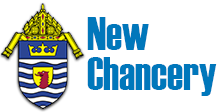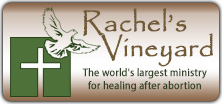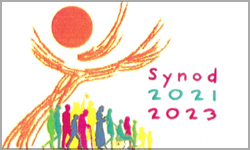My dear Brothers and Sisters in Christ,
 I was asked recently to make a presentation to “Truth Poured Out,” a group of young adults in the Diocese of Lake Charles. The topic was to be my choice. So I decided to share some thoughts on “What Really Matters.” Why? Because every day the challenges of life and society, the growing disaffection, the violence, the fragmentation, the abuse, and the futile measures to address these issues remind me that we place too much confidence in human efforts. No new procedures, policies, government programs, laws, and “think tank” conferences—however well intended and necessary—will permanently “solve” anything. They may give us some false satisfaction that “now we’re finally doing something about it,” but they are truly bankrupt if we pursue these solutions without faith in God. Hence, I ask myself the question, “What really matters?” And the answer continually comes back, “God.”
I was asked recently to make a presentation to “Truth Poured Out,” a group of young adults in the Diocese of Lake Charles. The topic was to be my choice. So I decided to share some thoughts on “What Really Matters.” Why? Because every day the challenges of life and society, the growing disaffection, the violence, the fragmentation, the abuse, and the futile measures to address these issues remind me that we place too much confidence in human efforts. No new procedures, policies, government programs, laws, and “think tank” conferences—however well intended and necessary—will permanently “solve” anything. They may give us some false satisfaction that “now we’re finally doing something about it,” but they are truly bankrupt if we pursue these solutions without faith in God. Hence, I ask myself the question, “What really matters?” And the answer continually comes back, “God.”
I am writing to you to address the topic of prayer. Prayer is simply our conversation with God, and we desperately need to have a vibrant prayer life. Let us first briefly mention what prayer is not. When we make a decision to pray, we often turn to a technique. This is not the best approach. As a matter of fact, it has never been the approach of our finest Catholic spiritual writers. The great Catholic masters of the spiritual life would have denied emphatically that their teachings or writings on prayer could be reduced to a technique. Prayer is not a program for human development, a self-help approach to make us better human beings, or simply a good way to start our day. Prayer is life, a relationship, and an intimacy with God that no one can interrupt or deprive us of, except we who stubbornly maintain a self-willed independence in the face of our Creator.
So, where do we begin? With God, of course. The Master Himself begins here when He teaches His disciples to pray: “Our Father in heaven” (Matthew 6:9). They must be the first words in our mind, on our lips, and in our hearts. God is a Father. His name is holy, and we should keep it so. We want His kingdom to come and His will to be done “on earth as in heaven” (Matthew 6:9-10).
I wish to delve into that petition of the Our Father—“thy will be done, on earth as it is in heaven.” What I am about to say is based on a personal experience from many, many years ago. So often when we go to prayer, it is because we are having a difficulty that seems insurmountable. Some of us face these challenges more often than others, but they confront all of us regardless of our feeble human efforts. Here is where “thy will be done” made a profound impression upon me. When we say those words to God the Father, in effect we are saying, “Here is a problem I cannot solve. As a matter of fact, I can never solve any of my problems. Submitting to Your Will is a supreme act of freedom. In professing faith in Your Will to be done on earth and in heaven, I am saying, ‘You know what is best and what happens must be and will be Your Will.’” I must simply submit, something that we resist in this modern society with its obsession over egotistical independence, but this submission is to a God who loves us and is love itself. In being selfless this submission resists the ego. In this lies the essential difference. God is and should be everything for the Christian.
In this simple realization about God’s Will being done, I find a great deal of freedom. In embracing this trust in God’s loving Will, we are freed to act as we should, as we must. I am reminded of the insight of St. Thomas Aquinas, quoting another great Catholic saint, St. Gregory the Great: “We pray not that we may change the divine disposition, but that we may impetrate [obtain by asking] that which God has disposed to be fulfilled by our prayers, in other words, ‘that by asking, man may deserve what Almighty God from eternity has disposed to give’” (St. Thomas Aquinas, Summa, II, IIae, q. 83, a. 2, quoting the Dialogues of St. Gregory the Great). That quote is so rich in meaning and significance that it requires we dwell on it a while. It deserves more than just one meditation.
As “Our Father in heaven,” God has charted a course which is moving towards a final consummation in Him. Our imperative, what we must do, is join ourselves to that course which leads to that good. The Sacred Scriptures speak abundantly about this, but one passage from St. Paul, a favorite of mine, stands out: “We know that all things work for good for those who love God, who are called according to his purpose” (Romans 8:28). That conclusion of St. Paul is the same as that of St. Thomas Aquinas and St. Gregory the Great. It should be ours also.
Why do we act contrary to this Divine Will? We all know the answer to this question. St. James explains it this way: “Where do the wars and where do the conflicts among you come from? Is it not from your passions that make war within your members? You covet but do not possess. You kill and envy but you cannot obtain; you fight and wage war. You do not possess because you do not ask. You ask but do not receive, because you ask wrongly, to spend it on your passions” (James 4:1-3). The human will that is consumed with its passions, that covets what it cannot possess, seeks happiness in the wrong places and fulfillment in empty pursuits, can find satisfaction in nothing and finally ends by rejecting the Divine Will.
The “Our Father” introduces a world and an approach that is transforming because it frees us. Prayer is the entry point to this world. For this reason, Christians down through the centuries have acknowledged the Lord’s Prayer as the most perfect prayer. The “Our Father” is our blueprint for prayer, as our Lord Jesus Christ intended.
What really matters? The answer is simple—God. Prayer is important because it is our conversation with our Father, our Creator, the Origin of everything that is. He is even the Origin of our interior life. Pope Francis made a Christmas gift to his cardinals of a long-neglected classic, The Spiritual Life by Adolphe Tanquerey. Inspired by his gesture, I revisited this powerful work and came across the following quotation: “Gathering all that is found here and there in the Scriptures, we can say that God through grace is present within us as a father, as a friend, as a helper, as a sanctifier, and that in this way He is truly the very source of our interior life, its efficient and exemplary cause” (Tanquerey, Chapter 2, no. 92). This is quite a profound observation.
If God is “the very source of our interior life,” then we discover Him by navigating the interior life by means of prayer. He awaits us, just as certainly as the mountain source of a mighty river awaits the explorer who travels its waters. Take the plunge. Discover the source.
Do not allow your sins to get in the way. Confess them and be reconciled. For this reason Jesus Christ gave us the Sacrament of Penance. Then, turn off the computer, the radio and television, stop the electronic communications, omit Facebook, and seek the silence of adoration before the Blessed Sacrament and, in its absence, the quiet place which can serve as your refuge. Begin with the “Our Father.” What does it say? What are you refusing to hear? And most importantly, what is it saying to you?
When I issued my decree on the First Sunday of Advent last year, I had the Blessed Sacrament on my mind, as we all should. I insisted on Adoration weekly in our parishes. I wanted Eucharistic processions. These are not ends in themselves. The Church gives them to us for a reason. They are means to the end of enriching our experience of Christ in His Eucharistic Presence and the celebration of Holy Mass. Is Christ not the “daily bread” for which we pray in the Our Father?
I will return to you on this topic of prayer in the future. As I said in the letter that accompanied my Advent decree, there is more to come, and I am pleased to share it with you.
With prayers for a holy Lent and extending my blessings to you for the pursuit of “what really matters,” I remain
Sincerely yours in our Lord, 
![]() Glen John Provost
Glen John Provost
Bishop of Lake Charles
















